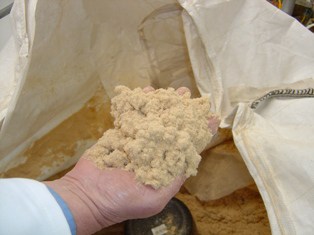The process, developed by Macclesfield-based MDF Recovery, exploits a technique known as ohmic heating, commonly used in large-scale food manufacturing, to heat medium density fibreboard (MDF) to break down the resins that bind it together. This recovers a wood fibre which the company claims is the same quality of virgin wood fibre and can be used to produce new MDF or natural thermal insulation.

The patent for the process was awarded by the United Kingdom Intellectual Property Office.
MDF Recovery says the technology will benefit the MDF manufacturing sector by providing a long term supply of high quality fibre at a time when competition for virgin timber is at an all time high due to an increase in biomass energy generation.
It is also expected to be used by waste management companies, which MDF Recovery claim could use it to recycle of commercial and industrial MDF waste streams. According to WRAP, Britain disposes an estimated 340,000 tonnes of MDF annually.
The company envisages the technology will be of most interest to MDF manufacturers to use on their sites to process off-cuts as well as retailers and businesses who generate a lot of MDF waste. It claims that material from council civic amenity sites might be harder to put through the process because the material needs to be just MDF and not mixed together with other material, as is the case with material from households.
Our process has the potential to revolutionise the management of waste MDF in the UK and globally, said Craig Bartlett, co-founder of MDF Recovery. It means we can recycle rather than burn this material which is appealing to a lot of people.
Funding
The company is now seeking funding to design and build a small demonstration facility to help prove the technology on a commercial scale, which it is hoping to develop by the end of 2012. It then intends to sell licenses for the technology and develop its own full-scale plant capable of processing around 30,000 tonnes of MDF a year.
We are in discussions with two large global MDF manufacturing groups, said Mr Bartlett. We have been to talking to a dozen venture capital companies. We have also had a lot of interest from countries such as Turkey, Korea and Brazil.
Company
MDF Recovery is a start-up company founded by Mr Bartlett and Jim New, who have managed to attract significant interest in the technology, with the Sunday Times and Radio 4 both profiling the company and its ambitions.
I used to work for the Furniture Industry Research Association (FIRA) for ten years and we were looking at various ways of recycling MDF because the demand was clear, explained Mr Bartlett. FIRA developed an MDF recycling technology using microwaves and I left to work for a company that licensed it. But that work came to a halt and we saw a market gap, so we developed our own technology.
Related Links
C-Tech Innovation, a contract research and engineering firm, helped MDF Recovery to develop the technology in 2009 at its laboratories near Chester, with the help of a 25,000 grant from the now-defunct North West Development Agency.
Under the MDF recycling process, MDF is shredded into uniform particles of 20-25mm in size. Water is then added and it is run through the ohmic heating process which frees up the individual fibres and can also remove laminates. The material is then mechanically agitated to fluff it up and then dried if necessary, depending on the end use.


Subscribe for free